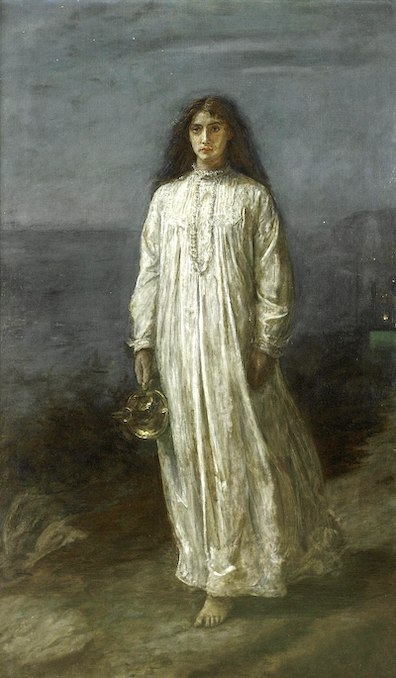At certain points the Ithaca narrator's fondness for
abstract, polysyllabic Latinate words extends even
to creating new ones. Not long after noting Bloom's history of
somnambulism,
the chapter plays with the term: "What proposal did Bloom,
diambulist, father of Milly, somnambulist, make to Stephen,
noctambulist?" Noctambulism is part of the English lexicon,
but Joyce coined "diambulist." These terms sound
scientifically precise, but in all three cases the narrator
uses them in slippery, playful ways that undermine his air of
authoritative summary.
"Milly, somnambulist" sounds straightforward, because
the narrative has mentioned two times, at ages 6 and 8, when
she "had uttered in sleep an exclamation of terror and had
replied to the interrogations of two figures in night attire
with a vacant mute expression." But there is no mention of
Milly actually sleepwalking. Clearly she has suffered from one
or both of the closely related sleep disorders called night
terrors and confusional arousal. But the text does not say
that she had been walking around when her parents responded to
her scream and saw her "vacant mute expression." It does say
that Bloom once did this: "once, sleeping, his body had risen,
crouched and crawled in the direction of a heatless fire and,
having attained its destination, there, curled, unheated, in
night attire had lain, sleeping." It would seem more accurate,
then, to speak of "Bloom, somnambulist."
The phrase "Stephen, noctambulist" employs a synonym,
long-established but less widely used. Etymologically,
somnambulism is walking in sleep while noctambulism is walking
at night, but the dictionary definitions are the same. Nothing
in the chapter, however, or in Joyce's earlier fictions for
that matter, suggests that Stephen has ever walked in his
sleep. Here the word seems to refer to the fact that Bloom has
interacted with him (in Oxen of the Sun, Circe, and
Eumaeus) while walking around Dublin at night, and to
the fact that Stephen (at the end of Ithaca) will walk
off into those dark streets once more. The latter reference is
highly relevant to the paragraph in which the word appears,
because it answers its question by saying that Bloom offers
Stephen a place to stay for the rest of the night. But in
creating these rich suggestions of "noctambulism" Joyce
changes the meaning of the word.
Finally, calling Bloom a "diambulist" goes outside the
bounds of English dictionaries altogether. If nox, nocti-
(night) + ambulare (to walk) can be twisted to
mean not sleepwalking but simply walking about at night, then
why not use dies, di- (day) + ambulare to name
a man who spends his days walking about? One might suppose
that these contrasting terms are meant to communicate some
essential meaning (e.g., Bloom is a day-walker because he is
more practical than Stephen and, as a rule, prudently comes
home when it is getting dark rather than stumbling from pub to
brothel), but it seems more likely that the narrator is simply
having fun with language. Instead of attempting some serious
distinction he amuses himself by watching Latin roots combine,
signify, recombine, and resignify, rather like Stephen in Eumaeus:
He could hear, of course, all kinds of words
changing colour like those crabs about Ringsend in the
morning, burrowing quickly into all colours of different sorts
of the same sand where they had a home somewhere beneath or
seemed to.
